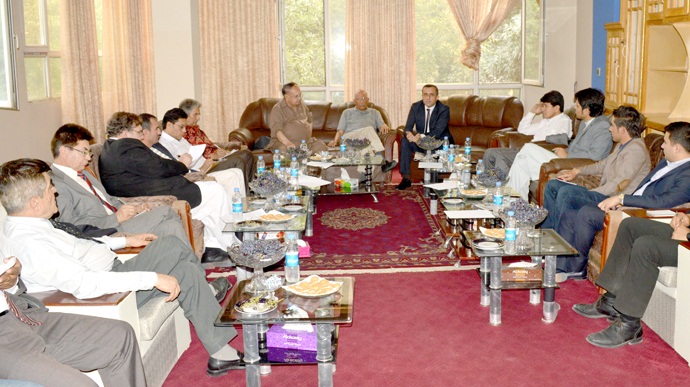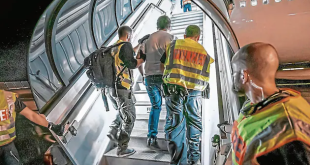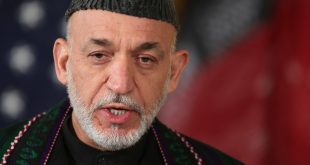“Pakistan’s demands are that Afghanistan should cut off ties with India; recognize the Durand Line as international border through border cooperation pact; access to Central Asia; creation of China-Pak consortium that can use Afghanistan’s natural resources through a single-bidding process, resolve the water issue, and train at least 30 percent of Afghan army” —Amrullah Saleh
AT-KABUL: The former chief of the National Directorate of Security (NDS) said that Pakistan was encouraging the Taliban to continue fighting Afghan security forces and push on the war for one more year.
Addressing a monthly gathering of the Rana Think Tank, the ex-spymaster Amrullah Saleh said that Islamabad does not want to give dignified peace to Afghans.
Commenting on the recent direct talks between Afghan government and the Taliban in Murree, he said the reconciliation process would not be successful as Islamabad was controlling the dialogues. He said that Pakistan’s cooperation with Afghanistan was not based on sincerity.
“First we should come to the point that why the peace talks started now while it was the government’s policy since 2006. I see this process divided into four phases: The first phase began after 9/11 [attack on the twin towers in the US]. The United States was extremely emotional in this period. Pakistanis started a decisive cooperation with the west and showed that once again after 1980s Pakistan was at the frontline to protect their interests. In the past it was during the rule of Pakistani military dictator, Ziaul Haq. They proved that yesterday they were at the frontline against communism and now against terrorism but it was decisive. This period lasted from 2001 until 2005,” he said, adding that during 2001 and 2005 the highest number of the Taliban fighters that Pakistan arrested and handed over to Afghanistan was not more than 10 people who were not so famous.
“I call this a very important period. The second period started from 2005 to 2008 in which Pakistanis allowed the Taliban to go to the most remote areas of Afghanistan and create bases there, particularly in south—the places that were not important strategically,” he recalled.
During this period, Americans rejected President Karzai’s suggestion for having a powerful army, Saleh said.
“Islamabad wants to help the Taliban to enter into the advanced stalemate against Afghan government. To do so, Pakistan wants to continue fueling insurgency in Afghanistan. Pakistan wants to protect the Taliban as its armed group. Current peace process is mostly about ceasefire rather than durable peace,” he opined.
Saleh said that this strategy of the Pakistani military establishment is against the promises they have given to President Ashraf Ghani about the peace talks.
According to the former chief of the NDS, Pakistani spy agency, Inter-Services Intelligence (ISI), has fifty percent control over the peace process. “Those who sat with representatives of the Afghan government in Murree for peace talks are ISI agents living in Islamabad for the past several years. With this structure ISI wants to create legitimacy problem for Kabul under the pretext of Afghan-led and Afghan-owned peace process. In real sense, the process is neither Afghan-owned nor Afghan-led,” he said.
He said that such kind of negotiations would not bring dignified peace to Afghanistan which is major demand and a dream of every Afghan because ISI is leading the reconciliation process.
“Every Afghan wants a legal and independent government of which only unarmed Taliban should be part. However, ISI does not want so. ISI cheated President Ghani and did not fulfill its promises, because it is not helping the Afghan president honestly in the peace process, though ISI received many favors from Kabul,” said Saleh.
He further said that the Afghan president showed political courage to accept all demands of Islamabad aimed at bringing peace. However, it did not help Kabul.
“As a matter of fact, the result of peace talks would be uncertain until NATO and the US pullout troops from the country because Pakistan is well-informed of the plans of the US and NATO. Islamabad would try to cash the opportunity and turn it into a prize while prolonging the war until most of its interests were secured,” he said.
Speaking about gains that Islamabad made through the Afghan peace process, he said that President Ghani refused to take military support from India and relations between Kabul and New Delhi dropped. “Soon after assuming office as president, Ashraf Ghani visited Islamabad, Saudi Arabia and China in order to please Islamabad. However, ISI is not satisfied because it wants to secure its own interests in the peace talks. ISI does not want a prospective peace and stability in Afghanistan,” he said.
Saleh went on to say that Islamabad has six major demands, some of which are against Afghanistan’s interests and would turn the country into a protectorate state. “Pakistan’s demands are that Afghanistan should cut off ties with India; recognize the Durand Line as international border through border cooperation pact; access to Central Asia; creation of China-Pak consortium that can use Afghanistan’s natural resources through a single-bidding process, resolve the water issue, and train at least 30 percent of Afghan army,” he said.
He said that Pakistan wants Afghanistan to have a framework for its strategic cooperation with other countries. “They want to set a framework for Afghan government through which they will allow Kabul to manage its strategic cooperation with other countries. They want to change us to protectorate,” he added.
Based on his experience as former chief of the Afghan spy agency, Saleh advised the government to prevent peace talks from fragmentation. He said that President Ghani should directly lead the talks himself for fruitful results.
The ex-chief of the NDS blamed the US and NATO for continuation of war in Afghanistan, adding that they did not provide required support to Afghans.
“NATO and the US were carrying out their own strategies without considering the genuine demands of Kabul. They say that their support would be scheduled based while Afghanistan says that it should be situational based and unconditional. Afghans want that NATO should consider their demands,” he underlined.
He said the United States’ policies are not clear which also annoyed the former president Hamid Karzai.
The ex-chief of NDS said that Washington on the other hand also provided financial support both to Islamabad and Kabul that also prolonged the Afghan war.
The former president of the US, George Bush, did not listen to Hamid Karzai’s demands about required military support, he said.
The Taliban started activities in Helmand for the first time but Washington was not ready to increase the number of Afghan troops. The then NATO chief rejected our demands and launched operations which were not productive, he added.
He also criticized the US authorities decision to send 100,000 troops to Afghanistan instead of increasing strength of Afghan army. He said that Karzai repeatedly urged Washington to strength the Afghan security forces and increase their number but the US was not interested which resulted into continuation of war for long-term.
 Afghanistan Times
Afghanistan Times




